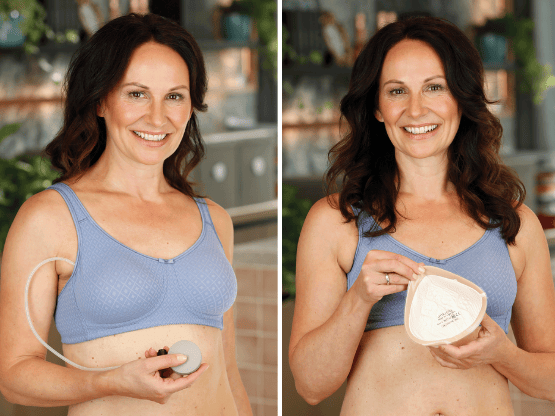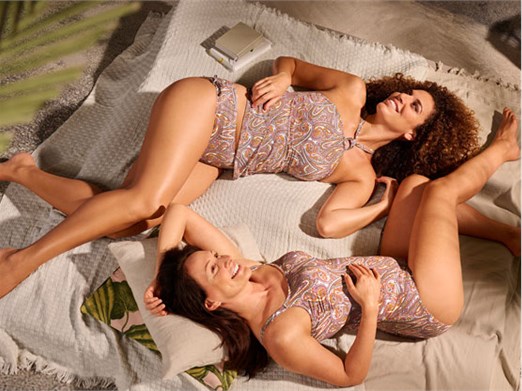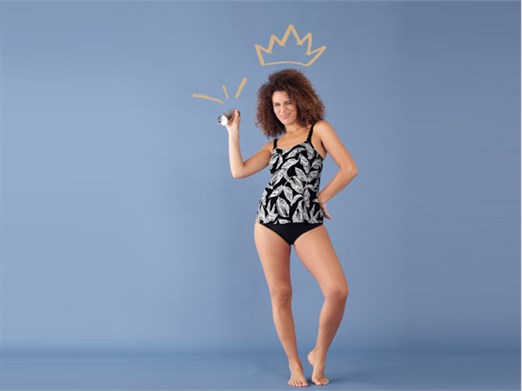Second chances
Dramatic action that flows from a big wake-up call
By Christina Relf
When you talk to women who’ve made significant changes following breast cancer, certain shared sentiments emerge. You hear phrases like ‘I learned to put myself first,’ and ‘this was a second chance,’ and ‘it’s up to you to decide what you do with your life.’ And while it’s true that no one would wish for a diagnosis of cancer, many women find that when it strikes, cancer gives them a changed perspective on what really matters, causing them to take stock.
Ironically, too, it’s often when they are at their weakest emotionally and physically - after debilitating surgery, chemotherapy and radiotherapy, in fear of their lives and struggling to get through each day - that some make massive life changes. It’s as if a near-death experience has given them the strength to do what they had always dreamed of, but never before thought possible. Or in some cases, cancer has put them in touch with ambitions and desires they never even knew they had.
Moving story

Nobody ever said that making huge life changes is easy. But Anne-Mary Degousee-Molinie believes the changes she made were necessary for her very survival. “When I was first diagnosed in 2005, my then husband - who was a doctor - considered me to be already dead. But I wanted to stay alive! I realized he simply wasn’t giving me the support I needed. Just before my radiotherapy I told him I was going to leave him, as I’d thought very deeply about what my body was telling me, and I had concluded that my unhappy marriage was bad for my health.”
It was terribly difficult for her to leave her husband and move away from the village in France where she’d lived for so many years but, she says, “Despite my treatment leaving me physically weakened, I was very strong emotionally and determined to go through with it. Once I had moved away, I felt I could concentrate all my energy on making my body healthy again.”
Two years after making this huge life change, Anne-Mary met the wonderful man who was to become her second husband. In due course, Anne-Mary was going to need all the care he could provide, as she had to face a further diagnosis in 2011. “He was a tower of strength and supported me every inch of the way,” she says, “even when I refused chemotherapy after my mastectomy.”
Another key contributor to Anne-Mary’s new-found equilibrium was giving up her demanding and stressful job - something that, in hindsight, she wishes she’d done earlier.
She recognizes that other women might lack her initial determination, and she advises thinking carefully before taking the path that feels right. But she still believes that being ruthless worked for her: “Surviving cancer is about finding out what is really important and focusing only on that.”
Lights, camera, action!

The impact of breast cancer treatment on a woman’s self-esteem. Just do it can’t be underestimated. It’s not about vanity, it’s about our entire concept of ‘self,’ and it doesn’t helpt hat breast cancer often strikes at mid-life - a period when women naturally take stock of their appearance and how they present themselves to the world. This in itself can trigger insecurities, quite apart from the added trauma of losing a breast and having your hair and eyelashes fall out.
Reeling from her treatment and trying to find a way to brighten up her life during the long, cold Norwegian winter, Teresa Bancher came across a call for women to take part in a TV program called ‘Renewal with Jan Thomas’. Jan is one of Norway’s most prominent stylists. “I thought, ‘Why not try it? ’so I sent in an application. Perhaps Jan could help me on my way to personal renewal.” A few days later, she was invited to be in the show.
Teresa enjoyed being in front of the camera, which followed her through a week of transformations orchestrated by Jan - hair, clothes and make-up. She wasn’t as thrilled about the practical side as she had hoped: “To be honest, I didn’t like my hair color, the trousers they chose for me were too baggy, and the shoes were too big!” But she did find that the many comments from breast cancer sufferers who watched the program, and from the celebrities she met while filming, lifted her up immensely. “I felt like a queen! Everyone said how important it was for other women that I was prepared to tell my story and show them how I went about turning my life around. And the result was that I actually did start to take hold of my life. I learned to see that life could still be positive. It became more and more important to take care of Teresa, continue fighting, and never give up.”
Teresa’s journey wasn’t complete, however. She didn’t realize it at the time, but she was on her way to her very own version of paradise. “In May 2012 I went to stay with my friend Bente from Amoena Norway in her second home in Spain. I felt so much better after several days in the sun, it was easier to think about something other than cancer, and I started dreaming about getting a little apartment there myself.” By September, Teresa had turned her dream into reality, buying an apartment on the Costa Blanca.
Teresa does feel that her experiences have made her stronger. “I still have very tough moments in my life, but I recover faster than before,” she says. “Spain makes me happy. And now I live one day at a time. I’ve realized it’s not how I am that’s important, but how I handle the challenges I’m faced with.”
Just do it

As a beautician and make-up artist, Laura Mayot, diagnosed at 43, knows how important a woman’s looks are to her selfesteem: she prided herself on her healthy lifestyle, which made it all the more shocking when she was diagnosed. “My whole life changed in the blink of an eye,” she says. “How could this happen to me? Just three days before I turned 44, I started eight rounds of chemo. Not exactly the birthday present I had in mind!”
Laura’s personal epiphany wasn’t so much about making massive changes, but about realizing she could reclaim her life, take control of her thoughts and reactions, and be everything she had always been - and more - after her breast cancer. “I wanted to be in control of this monster inside my chest. It was going to be the fight of my life.” Complications from the radiation drastically reduced mobility in her left arm, and she has had to work determinedly with a massage therapist to address that.
She knows that her experiences changed her perspective on life. “A lot of positivity has come from being a breast cancer survivor. I used to get panic attacks, but when you get the worst possible diagnosis, it makes everything else seem petty. I don’t get them anymore - I have a life to live and I’m not going to waste it by worrying about things I can’t control.”
To help her regain fitness, Laura joined a dragon boat team near her home in Ontario. In their final race of the season her team made first place in the 200m mixed race, and she won her first gold medal. “Breast cancer might have brought us together, but each and every woman on the team is an athlete - strong, and determined to win. We have a saying on the boat: just do it - there is no ‘try’.” Laura is now looking forward to being part of the team when they battle to retain their title as the international dragon boat breast cancer champions in Florida in 2014.
Her fight to retain her self-esteem was further justified when she was asked to appear in a TV commercial for Amoena in Canada. Looking glowingly healthy, Laura models Amoena lingerie, pocketed swimwear and workout clothing to help show other women that it’s possible to look great after surgery and do all the things they used to do - and more.
She wants to share her appetite for life with others: “My advice is to live with passion every day. Events in our lives don’t define us - it’s how we rise after we fall that matters most. I don’t think I would change anything looking back, because although I couldn’t control the treatments, I could control my attitude on how I was going to tackle them. I live in the moment now - who knows what tomorrow may bring?”
Reaching the summit
 Some women respond to the suffering they experience by promising themselves that if they get through breast cancer, they will take on a challenge that’s equal to everything they’ve already been through, not just for themselves but on behalf of every other woman who’s enduring her own personal trials. When Malgosia Kurtyka-Koziol got the opportunity to climb Mount Kilimanjaro, she doubted she’d be up to it. But then she dared to dream.
Some women respond to the suffering they experience by promising themselves that if they get through breast cancer, they will take on a challenge that’s equal to everything they’ve already been through, not just for themselves but on behalf of every other woman who’s enduring her own personal trials. When Malgosia Kurtyka-Koziol got the opportunity to climb Mount Kilimanjaro, she doubted she’d be up to it. But then she dared to dream.
Not only had she come through radical breast surgery after finding a lump, she subsequently had her other breast and ovaries removed, following the discovery that she carried the BRCA1 gene. After the initial anger and fear, Malgosia says, “I began to understand that I must live for myself - not live the life of my children or my husband. So bit by bit, I started to change. My life became not just about doing everything for everybody, but about doing something for me. “
I used to run around in trainers and a track suit - I had neither the time nor the need to wear heels, dresses or make-up. But this disease reminded me I was a woman, and I started to dress more carefully and take better care of my skin. Suddenly I started getting compliments. I also met with a huge amount of kindness.”
When she heard about the Kilimanjaro expedition, organized by the Pokonaj Raka cancer foundation in Poland, Malgosia’s immediate reaction was that it wasn’t for her. She secretly dreamed of taking part, however, and decided tounder go the necessary fitness tests. Amazed to be approved as part of the team, she started preparations that included an 11-day “trial run,” medical tests, vaccinations and amassing the necessary equipment for the much bigger climb.
The experience was, she says, “exciting, chaotic, breathtaking,” and incredibly challenging. “I did it, though. I went all the way to the top of Kilimanjaro and I know I will manage to conquer other peaks, including those in life.” For her, the road to the summit was like fighting breast cancer. “130 meters from the top I had a crisis of confidence. I was weak and tired. I felt I couldn’t go on. Then I remembered a point in my chemotherapy when I’d felt just the same. I’d had enough - I wanted to give up, but the prospect of telling my husband and children was enough to change my mind and I soldiered on. And in the same way, I fought on to the top of the mountain.”
Malgosia’s personal journey was about taking ownership of her life. “I now know that a woman can do everything.You don’t have to wait until you get the all-clear. I went and got myself a new life, and I can’t waste it. And what I’d say to others is don’t wait—listen to your inner voice, let your intuition speak and have no fear.”
It’s time to thrive
So what inspires women to undertake great challenges like these? We asked reinvention expert Ann Fry for her thoughts. “A lot of people, when they come through cancer, do a re-evaluation. I used my own breast cancer experience as a catalyst for a new career direction, and I share my story with people to prove that it’s possible to cope with being diagnosed at 63 when you’re living in a new city with no family around you and no one to support you. I am living proof that you can do it, and I hope I’m an inspiration for others.”
Ann calls herself a ‘catalyst for change and reinvention.’ A professional speaker and executive coach, with a background as a psychotherapist, college professor and healthcare administrator, breast cancer was not part of her personal reinvention plan - particularly when she had just moved from Texas to New York City to start a new adventure. But, says Ann: “I faced it as a reality, used my resiliency skills and I’m now thriving.” (Visit her website at www.iamathriver.com.)
For Ann, one of the most important lessons she learned when going through treatment was to allow others to help her. She tells the story of struggling across the street to pickup her cleaning from the local laundry one day. “I was in the middle of chemo, tired and feeling so weak. When I got back to my apartment building, the doorman said: ‘You don’t have to do that - we can do it for you!’ I just burst into tears. So my advice to women who want to make changes, to thrive - not just survive - is to tap into your inner strength, believe that whatever happens you will deal with it, but do ask for help when you need it.
Barriers? What barriers?
We’re not all able to become life coaches, TV personalities or mountaineers. But most of us have an idea where we would like to be if there were no barriers. And this is where breast cancer acts as an amazing catalyst, because at first it presents what seems like the highest possible barrier but then, once women have faced and overcome it, they sometimes feel able to take on the world.
Ann runs workshops for people who want to reinvent their lives after cancer. “Unless you’re very happy with your life already, if you just do the same old same old, if you’re not happy, you need to take stock. Just think - if you could wave a magic wand, what would your life be like? And go for your dream.”
This article was previously published in our Amoena Life magazine, the latest copy of which can be read online here. To make sure you hear about our new releases as soon as they're available, sign up for our e-newsletter.
Writer, stylist and communications consultant Christina Relf lives near Winchester in the south of England. She is passionate about creating the life you want and the importance of doing what you love, as often as possible.

 AUSTRALIA
AUSTRALIA BELGIË
BELGIË CANADA
CANADA DANMARK
DANMARK FRANCE
FRANCE ITALIA
ITALIA NEDERLAND
NEDERLAND NORGE
NORGE POLSKA
POLSKA REST OF THE WORLD
REST OF THE WORLD ESPAÑA
ESPAÑA SVERIGE
SVERIGE UK
UK USA
USA






